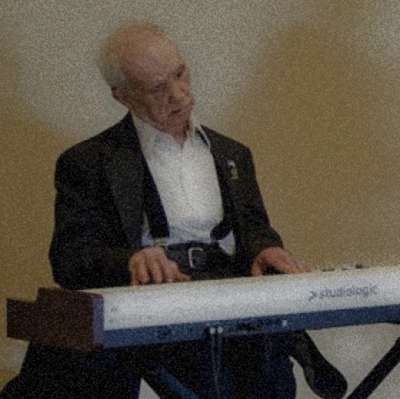.
.
New Short Fiction Award
Three times a year, we award a writer who submits, in our opinion, the best original, previously unpublished work.
Justin Short of Shawnee, Kansas is the winner of the 48th Jerry Jazz Musician New Short Fiction Award, announced and published for the first time on July 13, 2018.
.
.

Justin Short
.
*
.
Justin Short’s fiction has previously appeared in places like .The Arcanist,. The NoSleep Podcast, Broken Pencil, and .Dear Abby.. He can be found online at. www.justin-short.com.
.
.
______
.
.
.
The Wailing Wall
by
Justin Short
.
______
.
When they came to build the wall, I played Mingus.
I stood in the blistering sun, watched them arrive, and did my best to blow my lungs clean out. They climbed down from hissing dew-sprinkled trucks, adjusted their hard hats, and went to work setting up the barricades. They ignored me completely.
They didn’t ignore me long. I was off-key, and I was loud. Ain’t always about hitting all the right notes, man. A clarinet’s gotta be raw. Real. None of that philharmonic fast food commercial stuff.
I could almost hear Tony taking the high notes right beside me. He would have, too. He always loved a good revolution. But they really gave it to him this time. Ten years, man. Ten years for a couple measly grams.
My serenade lasted all day. The spit sizzled on my sidewalk shadow; my denim crackled and steamed. I guess I was hoping for a miracle. Construction workers can have epiphanies too. Maybe they would see the error of their ways, come to their senses, tell their boss to shove it. Anything’s possible.
I went to see Tony afterwards. He looked good. The prison-issues made him look a little like a nurse, and we both laughed at how the sight of him in a hospital room would scare anyone back to perfect health.
“I want you to have my old horn,” he said.
“I can’t.”
“Dude, just take it. Before my crazy family gets their hands on it. They’ll be at the pawn shop so fast it’ll make your head spin.”
“Fine, fine. I’ll keep it safe. But only till they let you out.”
He laughed.
I went to the storage unit later that night. Dug through mountains of sheet music and faded set lists. Finally found the case buried under a stack of sleeveless Coltrane records. I flicked my fingers against the ancient latches and popped it open. The dusty clarinet slumbered in green felt. I stood there a minute in the air-conditioned stickiness, remembering the old numbers. Remembering his embouchure.
I played Ella Fitzgerald the next morning. It was a hundred and two degrees out, and the trucks burped soft-serve concrete in neat little rectangles. My lips cracked, and the blood pinkened my reed. Sweat singed my eyeballs and glued my hands to my horn.
Another day, another night, another morning. They blended together, each one just a little hotter than the last. Steel followed concrete, and the beams grew higher and higher. I sang my appeal, and wished Tony could do the same. His was by the books: lawyers, money, more money. Mine was a gut-feeling kinda thing. Basie in the morning, Ellington at noon, Satchmo at night. A screechy call-to-arms, an instrumental middle finger.
The night they picked Tony up, they put him in a room for hours and hours. Cop after cop slamming fists on the table, asking him where he got the stuff, who the big movers were, threatening everything under the sun if he didn’t name names.
Tony ain’t like that. He ain’t a snitch. He just likes to smoke a joint on the back porch now and then.
Who doesn’t?
He wouldn’t play their game, so they played it for him. Gave him ten. That’s how they operate, man. They didn’t ask for character witnesses. Didn’t give him a chance to bust out La Vie en Rose in the courtroom. If they would have, I’m convinced the judge woulda wiped back a couple tears and told him he was free to go.
He says he’s still getting used to his new neighbors. The killers and rapists and all those guys. Crazy how they threw an old hippie in with the worst of the worst. But Tony can make friends with just about anyone. One thing he’ll never get used to, though, and that’s the walls.
Me neither.
My horn didn’t seem to be slowing them down. If anything, it had the opposite effect. Hammer pounded nail in double-time, a staccato thwack-thwack-thwack that made me wonder if they ever stopped long enough to question any of it. Their role. Their silent heil. Who they were blocking out, blocking in.
As the power tools whined, the Rio Grande disappeared little by little. I painted Guaraldi in the spaces between their chaos. Wept Miles from a sidewalked kitchen chair. Injected their backbeats with sizzling Dizzy. I gave them squealing, howling minor keys. Dying-cat deep cuts. My sunburn was bubbled and purple by the time they strung the prison wire on top.
I guess I knew it was over. This thing was really gonna happen. Had happened. They turned me into Tony. Only difference was the size of the exercise yard.
I played his horn the night they finished. Sat in the moonlight and pulled the pieces out one by one. Worked up a sweat jamming them together. As I twisted the mouthpiece into place, I saw his old teeth marks, deep and jagged. Like a wild animal had torn into it.
It was all over, but I played anyway. I had to play. Sometimes you gotta stand on the concrete at midnight and bleed Bill Evans through your reed.
The workers are gone now, but they left their scent behind. Their beer cans, their empty pizza boxes, their cigarette butts. But mostly, they left that thing. Nineteen feet of blinding steel. Two stories of neighborly love.
I spend most my sunsets at the wall. I use his horn. I took it to the shop for repairs, but half the notes still won’t play right. I dig the imperfection.
I don’t know who I’m playing to anymore. The men who paid me in chucked ham sandwiches are long gone. Now it’s only me. Me and the shadow of the wall and the eerie echo as I cry my way through an old song. Maybe I do it for Tony. Maybe I think we’re both looking over walls and wishing for freedom, like we’re characters in some mushy old movie staring at the moon and singing the same song at the same time.
Who knows, man.
Some nights, if the wind’s not too loud, I hear another sound. It’s soft and far away, like he’s standing just on the other side, turning my solo into a duet.
.
.
_____
.
.
.
.
.








































very timely
Good story. Congratulations, Justin.
Well done. I will look for more of your work.
Wonderful story. I really enjoyed this one and loved the use of imagery. I’m a huge fan and will be looking for more of your stories.
Awesome imagery. I could almost hear him play.